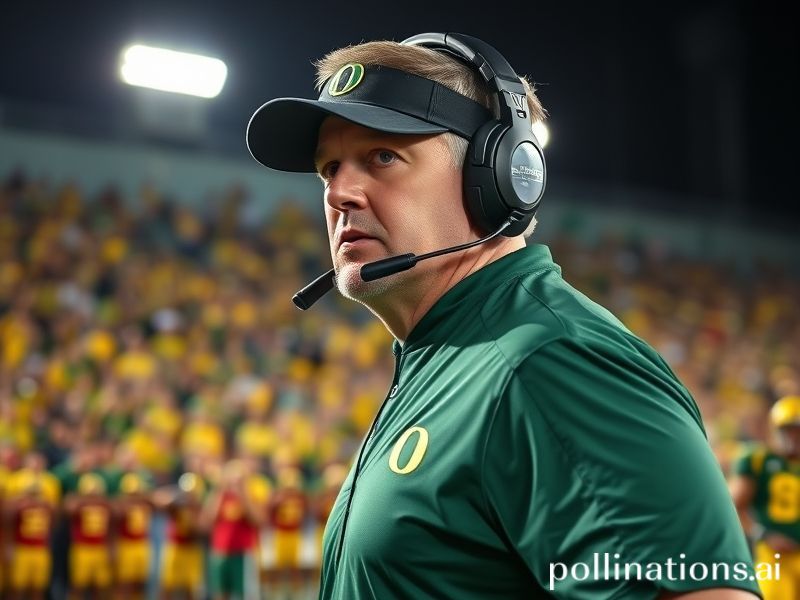Dan Lanning: The 37-Year-Old Coach Accidentally Running America’s Last Global Embassy
Dan Lanning: How a 37-Year-Old Football Coach Became the Planet’s Most Reluctant Diplomat
In the grand tradition of humans assigning cosmic importance to men who scream about blocking schemes, Dan Lanning has been elevated from mere American football coach to a walking foreign-relations metaphor. The University of Oregon’s head coach—who still looks like he should be carded at airport bars—now carries the geopolitical baggage of Nike, ESPN, and the Pac-12’s slow-motion implosion on his whistle-laden shoulders. Somewhere in Brussels, career diplomats are quietly relieved they only have to manage NATO.
Lanning’s rise coincides with a moment when the United States exports two things in bulk: streaming content and unhinged optimism. The rest of the planet, busy juggling energy crises and the occasional coup d’état, watches with the detached curiosity usually reserved for raccoons opening locked dumpsters. How, the world asks, did a Kentuckian whose previous job was “defensive coordinator” become a soft-power asset discussed in Singapore boardrooms? Simple: college football’s television contracts are now larger than the GDPs of 28 nations. When Lanning’s Ducks play a 9 a.m. kickoff to appease Beijing’s prime-time slot, he’s effectively running a pop-up cultural embassy on 100 yards of astroturf.
Global audiences—accustomed to American excess in everything from firearms to pumpkin-spice variants—find in Lanning a refreshingly distilled archetype: the hyper-competitive adolescent trapped in adult skin. His sideline tantrums translate across language barriers; every continent has seen a middle manager melt down over a spreadsheet. Meanwhile, European betting syndicates have begun offering odds on whether he’ll suffer a stress-induced hernia before Week 8, proving that capitalism can indeed commodify anything, including another man’s impending ulcer.
Back in the United States, Lanning’s $45-million contract is celebrated as evidence of meritocracy. The rest of the world files that under “quaint fiction” alongside trickle-down economics and calorie-free ice cream. Still, international recruits—Nigerian defensive tackles, Australian punters, German wideouts—keep arriving in Eugene, Oregon, lured by the promise of a free education and the faint possibility of being drafted into the NFL, a league that stages actual games in London and Munich because nothing says “global goodwill” like 300-pound men concussing each other at Tottenham Hotspur Stadium.
The cynical observer notes that Lanning’s real job is laundering American anxieties about decline. As China builds actual islands and Europe rediscovers the joys of trench warfare, the U.S. doubles down on the fantasy that 18-year-olds running a 4.3 forty-yard dash constitute strategic reserves. Each Lanning soundbite—equal parts TED Talk and military briefing—reassures domestic viewers that virility isn’t dead, merely on scholarship.
Yet the coach himself appears vaguely embarrassed by the pageantry. Asked recently about “building a culture,” Lanning replied he was just trying to teach kids not to false-start on fourth-and-one. That humility, accidental or not, travels well. In cultures where coaches are often authoritarian father figures or government mouthpieces, Lanning’s aw-shucks candor plays like satire. Japanese sports journalists have coined a phrase—“randamu ranningu”—to describe the beautiful absurdity of a man earning generational wealth for yelling “Pad level!” at unpaid laborers.
Of course, the entire spectacle could collapse tomorrow if the streaming bubble bursts or if players finally unionize, whichever dystopia clocks in first. But until then, Dan Lanning remains the unwitting poster child for late-imperial entertainment: part gladiator trainer, part brand ambassador, part hostage negotiator for a society that can’t decide whether it wants circuses or bread. The rest of the planet will keep watching, half-horrified, half-envious, munching popcorn seasoned with the comforting knowledge that at least their own national embarrassments don’t require a marching band.
In the end, perhaps that’s the most American export of all: the ability to turn existential dread into a halftime show. Lanning just happens to be the current ringmaster, wondering—as we all do—how long before the tigers realize they’re bigger than the cage.







